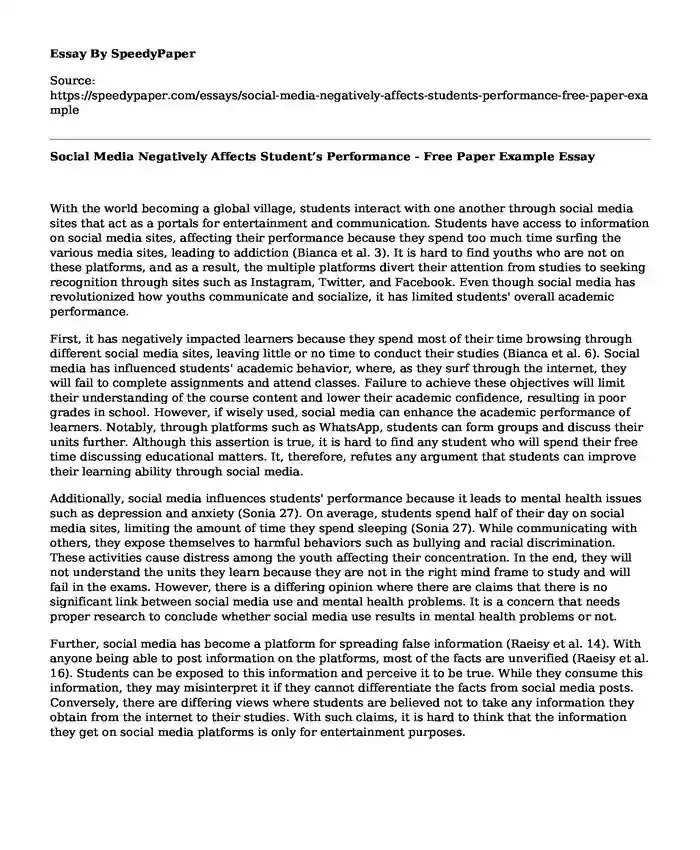
| Type of paper: | Essay |
| Categories: | Education Students Social media |
| Pages: | 3 |
| Wordcount: | 671 words |
With the world becoming a global village, students interact with one another through social media sites that act as a portals for entertainment and communication. Students have access to information on social media sites, affecting their performance because they spend too much time surfing the various media sites, leading to addiction (Bianca et al. 3). It is hard to find youths who are not on these platforms, and as a result, the multiple platforms divert their attention from studies to seeking recognition through sites such as Instagram, Twitter, and Facebook. Even though social media has revolutionized how youths communicate and socialize, it has limited students' overall academic performance.
First, it has negatively impacted learners because they spend most of their time browsing through different social media sites, leaving little or no time to conduct their studies (Bianca et al. 6). Social media has influenced students' academic behavior, where, as they surf through the internet, they will fail to complete assignments and attend classes. Failure to achieve these objectives will limit their understanding of the course content and lower their academic confidence, resulting in poor grades in school. However, if wisely used, social media can enhance the academic performance of learners. Notably, through platforms such as WhatsApp, students can form groups and discuss their units further. Although this assertion is true, it is hard to find any student who will spend their free time discussing educational matters. It, therefore, refutes any argument that students can improve their learning ability through social media.
Additionally, social media influences students' performance because it leads to mental health issues such as depression and anxiety (Sonia 27). On average, students spend half of their day on social media sites, limiting the amount of time they spend sleeping (Sonia 27). While communicating with others, they expose themselves to harmful behaviors such as bullying and racial discrimination. These activities cause distress among the youth affecting their concentration. In the end, they will not understand the units they learn because they are not in the right mind frame to study and will fail in the exams. However, there is a differing opinion where there are claims that there is no significant link between social media use and mental health problems. It is a concern that needs proper research to conclude whether social media use results in mental health problems or not.
Further, social media has become a platform for spreading false information (Raeisy et al. 14). With anyone being able to post information on the platforms, most of the facts are unverified (Raeisy et al. 16). Students can be exposed to this information and perceive it to be true. While they consume this information, they may misinterpret it if they cannot differentiate the facts from social media posts. Conversely, there are differing views where students are believed not to take any information they obtain from the internet to their studies. With such claims, it is hard to think that the information they get on social media platforms is only for entertainment purposes.
Conclusion
Summarily, the use of social media proves to be a distraction to the student's academic performance. It lowers their ability to concentrate in class while acting as a source of false information. With continuous advancement and development of new sites, social media platforms threaten the quality of education students will receive due to the interference they cause.
Works Cited
Barton, Bianca A., et al. "The effects of social media usage on attention, motivation, and academic performance." Active Learning in Higher Education. vol. 33, no. 1, 2018, pp. 1-12. www://journals.sagepub.com/doi/abs/10.1177/1469787418782817
Mahdiuon, Rouhollah, Ghasem Salimi, and Laleh Raeisy. "Effect of social media on academic engagement and performance: Perspective of graduate students." Education and Information Technologies vol. 103, no. 1, 2019. 1-20. www://link.springer.com/article/10.1007/s10639-019-10032-2
Santoveña Casal, Sonia. "The impact of social media participation on academic performance in undergraduate and postgraduate students." International Review of Research in Open and Distributed Learning vol. 20, no. 1, 2019, pp. 26-32. www://www.irrodl.org/index.php/irrodl/article/view/3751/4962
Cite this page
Social Media Negatively Affects Student's Performance - Free Paper Example. (2024, Jan 22). Retrieved from https://speedypaper.net/essays/social-media-negatively-affects-students-performance-free-paper-example
Request Removal
If you are the original author of this essay and no longer wish to have it published on the SpeedyPaper website, please click below to request its removal:
- Movie Review Essay Sample: Screening Report on Searching for Sugarman
- What Is Social Media Influence, Essay Sample
- Free Essay Answering Why Bilinguals Are Smarter
- Free Essay Sample on Performative Verbs
- Free Paper Sample on Social Media Platforms and Their Terms of Service
- Paper Example on Evaluation on To Kill a Mockingbird 1962
- Enforcement of the Human Cloning Act: The Case of the University of Virginia - Paper Example
Popular categories




